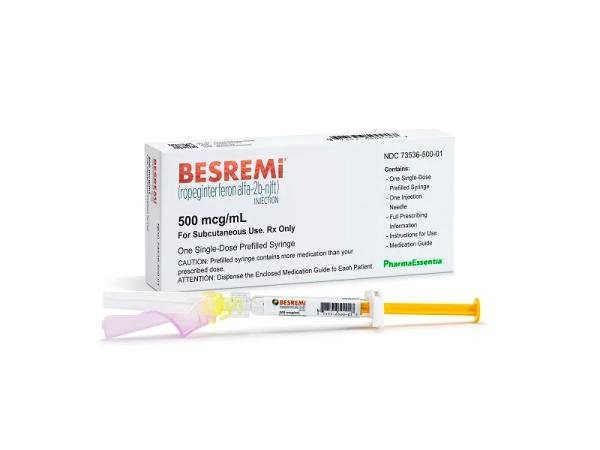Besremi Disease Interactions
There are 10 disease interactions with Besremi (ropeginterferon alfa-2b).
- Renal dysfunction
- Autoimmune diseases
- Hepatic dysfunction
- Cardiac disease
- CNS dysfunction
- Depression
- Thyroid dysfunction
- Colitis
- Diabetes mellitus
- Myelosuppression
Interferon alfa (applies to Besremi) renal dysfunction
Major Potential Hazard, Moderate plausibility.
Proteinuria (rare), not associated with a decrease in serum protein, is the most common renal toxicity observed with interferon- alfa therapy. Increased BUN and serum creatinine levels, hematuria, acute renal failure and nephrotic syndrome have also been reported. Therapy with interferon alfa should be administered cautiously to patients with severe renal dysfunction. Renal function should be evaluated in all patients before initiation of interferon- alfa therapy. In addition, patients with any degree of renal impairment should be carefully monitored for laboratory abnormalities and decreased creatinine clearance. A reduced dose of medication is recommended in patients with low CrCl (less than 50 mL/min - 30 mL/min).
Interferon- alfa (applies to Besremi) autoimmune diseases
Major Potential Hazard, Moderate plausibility. Applicable conditions: Autoimmune Disorder
Antiviral interferons may exacerbate autoimmune disorders such as myositis, thyroiditis, systemic lupus erythematosus, rheumatoid arthritis, psoriasis, or autoimmune hepatitis. Therapy should be avoided or administered with extreme caution in patients with autoimmune disorders.
Interferon-alfa (applies to Besremi) hepatic dysfunction
Major Potential Hazard, Moderate plausibility. Applicable conditions: Liver Disease
Hepatotoxicity, including fatal cases, has been reported in patients treated with interferon alpha. Additionally, the risk of hepatic decompensation and death is increased in patients with cirrhosis. Any patient developing liver function abnormalities during treatment should be monitored closely and treatment should be discontinued if appropriate. Interferon-alfa is contraindicated in patients with autoimmune hepatitis and decompensated liver disease.
Interferons (applies to Besremi) cardiac disease
Major Potential Hazard, Moderate plausibility. Applicable conditions: Cardiovascular Disease, Congestive Heart Failure, Ischemic Heart Disease, Arrhythmias
Hypertension, arrhythmias, angina, myocardial infarction, cardiomyopathy, and congestive heart failure have been reported during interferon therapy. Therapy with interferons should be administered with caution in patients with compromised cardiac function.
Interferons (applies to Besremi) CNS dysfunction
Major Potential Hazard, Moderate plausibility. Applicable conditions: Psychosis, Parkinsonism, Seizures
Reversible CNS effects such as seizures, mental status changes, manic behavior or psychotic reactions, gait disturbances, and dizziness have occurred in patients receiving interferons. Therapy with interferons should be administered cautiously in patients with or predisposed to seizures, psychiatric disorders, or conditions affecting posture or gait.
Interferons (applies to Besremi) depression
Major Potential Hazard, Moderate plausibility.
Interferons (alfa or beta) can induce depression and suicidal behavior. Suicidal attempts and suicides have been reported. Therapy with interferons (alfa or beta) should be administered cautiously to patients with or predisposed to mental depression. Clinical monitoring of psychological status is recommended.
Interferons (applies to Besremi) thyroid dysfunction
Major Potential Hazard, Moderate plausibility. Applicable conditions: Thyroid Disease
Thyroid abnormalities, hypothyroidism or hyperthyroidism, have been reported in patients administered interferons. Therapy with interferons should be administered cautiously to patients with thyroid dysfunction. If thyroid control cannot be maintained within normal limits with medication, interferon-alfa should be discontinued. Clinical monitoring of thyroid function is recommended.
Interferon alfa (applies to Besremi) colitis
Moderate Potential Hazard, Moderate plausibility. Applicable conditions: Ulcerative Colitis
Fatal and nonfatal ulcerative or hemorrhagic/ischemic colitis have been observed within 12 weeks of the start of alpha interferon treatment. Abdominal pain, bloody diarrhea, and fever are the typical manifestations. Treatment should be discontinued immediately in patients who develop these signs and symptoms. The colitis usually resolves within 1 to 3 weeks of discontinuation of alpha interferons.
Interferon alfa (applies to Besremi) diabetes mellitus
Moderate Potential Hazard, Moderate plausibility.
Flu-like symptoms frequently associated with interferon-alfa therapy can precipitate ketoacidosis in diabetic patients. Therapy with interferon alfa should be administered cautiously in patients with diabetes mellitus. Clinical monitoring of blood glucose concentrations and anti-diabetic therapy is recommended.
Interferons (applies to Besremi) myelosuppression
Moderate Potential Hazard, Moderate plausibility. Applicable conditions: Bone Marrow Depression/Low Blood Counts
Interferons (alfa and gamma) induce a dose-dependent, generally mild, myelosuppression. Leukopenia is the primary manifestation. Thrombocytopenia and anemia occur less frequently. Therapy with interferons (alfa and gamma) should be administered cautiously to patients with bone marrow suppression. Clinical monitoring of hematopoietic function is recommended.
Switch to professional interaction data
Besremi drug interactions
There are 453 drug interactions with Besremi (ropeginterferon alfa-2b).
More about Besremi (ropeginterferon alfa-2b)
- Besremi consumer information
- Check interactions
- Compare alternatives
- Pricing & coupons
- Drug images
- Side effects
- Dosage information
- During pregnancy
- FDA approval history
- Drug class: antineoplastic interferons
- En español
Related treatment guides
Drug Interaction Classification
| Highly clinically significant. Avoid combinations; the risk of the interaction outweighs the benefit. | |
| Moderately clinically significant. Usually avoid combinations; use it only under special circumstances. | |
| Minimally clinically significant. Minimize risk; assess risk and consider an alternative drug, take steps to circumvent the interaction risk and/or institute a monitoring plan. | |
| No interaction information available. |
See also:
Further information
Always consult your healthcare provider to ensure the information displayed on this page applies to your personal circumstances.


